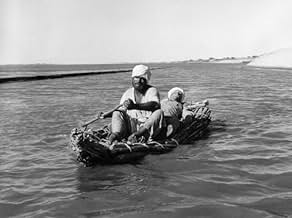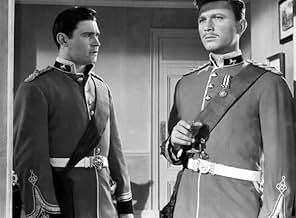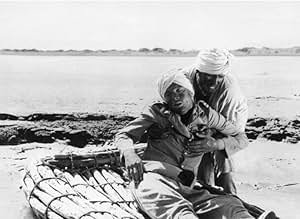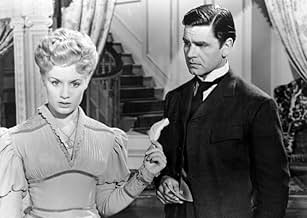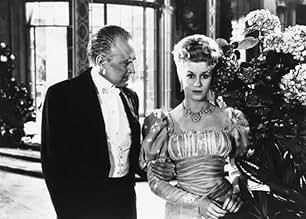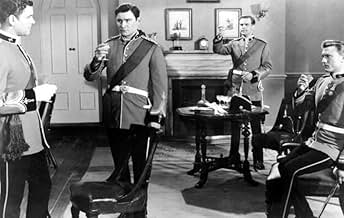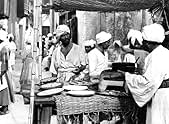IMDb-BEWERTUNG
6,2/10
708
IHRE BEWERTUNG
Füge eine Handlung in deiner Sprache hinzuA British officer resigns his commission on the eve of his regiment's departure for war in Sudan. Accused of cowardice by his friends and the woman he loves, he sets out to prove his courage... Alles lesenA British officer resigns his commission on the eve of his regiment's departure for war in Sudan. Accused of cowardice by his friends and the woman he loves, he sets out to prove his courage to them. A remake of "The Four Feathers" (1939).A British officer resigns his commission on the eve of his regiment's departure for war in Sudan. Accused of cowardice by his friends and the woman he loves, he sets out to prove his courage to them. A remake of "The Four Feathers" (1939).
Empfohlene Bewertungen
I had the advantage of watching Zoltan Korda's 1939 'The Four Feathers' on one afternoon and this his 'Storm over the Nile' on the next and since there have been at least 5 versions filmed cannot understand why it was not issued as 'The Four Feathers' or more appropriately 'The Two Feathers' as those given to Lieutenants Thomas Willoughby and Peter Burroughs were largely irrelevant to the plot although getting Harry Faversham flogged in the original and just incarcerated in the second ? One could believe John Clements considered himself a Coward but not Anthony Steele. I would cross the street and a few deserts for Mary Ure but not June Duprez- she deserved the far from noble Ralph Richardson but not Laurence Harvey who started off the sequel. Laurence Harvey started off with a reddish brown rat on his forehead which might well have saved him from Retinal damage when his lost his Hat. Indeed it is hard to select a single Actor or Actress who was better in the original and usually considered superior version but that is after we have watched both. As a stand alone Storm over the Nile is both more watchable and allowed Zoltan Korda to clean up several nonsenses from his original. Such as how and why John Durrance became sun blind. Ralph Richardson leading his troops keeping that he was blind a secret. The hovering vultures and other reasons why LH tries more convincingly to shoot himself. How Harry Faversham passed over the so important File and the Mahdi's guards searching them for it. All in all certainly not deserving the criticism - who shouldn't any Director use the same footage twice or shoot an overlong schedule and then divide it into two ? Nobody has to pay to watch any Film or spend the time glued to the telly.
A lot of critics gave this movie a really hard time. I never read critical reviews until I've seen a film and I must confess that I thoroughly enjoyed this one. Maybe it did use footage from a previous shoot and there were certainly flaws. But all in all, this was a good schoolboy yarn. I liked the lengthy build up to the scenes in Sudan, it really helped set the scene and made you care about the characters. The plot lingered long enough to give the viewer a feel of the longevity of the piece. The plot was well moved along and there was suitable emotion shown. James Robertson Justice so often just barks out his lines and in this movie he....Well, just barked out his lines! A real shame. A small blemish on an otherwise enjoyable movie.
One Sunday afternoon in 1982 BBC 1 broadcast STORM OVER THE NILE . Nothing remarkable in itself with this scheduling but later that evening the ITV channel broadcast THE FOUR FEATHERS remake from the late 1970s ! Two different versions of the same story broadcast a few hours within each other on the two network channels ! Amazing , and not something that was unnoticed since myself and several school colleagues remarked upon this the next day . We were all in unanimous agreement that STORM OVER THE NILE was the much superior movie . Strangely over the years every time Terence Young's version is broadcast the TV guides don't have kind words for the 1955 film version of AEW Mason's story and after seeing the original 1939 version of THE FOUR FEATHERS I understand why - It's a rip off !
In the past I have criticised movies like CRITICAL MASS and RANGERS that use extensive film footage from other movies like TERMINATOR 2 and NAVY SEALS . With STORM we see the exact same thing . The truly great battle scenes weren't directed by Young they were directed by Zoltan Korda almost 20 years earlier . To be fair I don't think the producers are claiming that this is an entirely original movie hence the credit for both Korda and Young in the directors slot but I did see the 1939 version a week earlier on channel 4 and this spoils the enjoyment of STORM since the script is identical as are most of the action scenes . If you've never seen the original you'll like this movie but if you remember the unforgettable 1939 version by the Korda brothers you'll be left with a cynical feeling watching this
In the past I have criticised movies like CRITICAL MASS and RANGERS that use extensive film footage from other movies like TERMINATOR 2 and NAVY SEALS . With STORM we see the exact same thing . The truly great battle scenes weren't directed by Young they were directed by Zoltan Korda almost 20 years earlier . To be fair I don't think the producers are claiming that this is an entirely original movie hence the credit for both Korda and Young in the directors slot but I did see the 1939 version a week earlier on channel 4 and this spoils the enjoyment of STORM since the script is identical as are most of the action scenes . If you've never seen the original you'll like this movie but if you remember the unforgettable 1939 version by the Korda brothers you'll be left with a cynical feeling watching this
Being something of a pacifist, Harry Faversham (Anthony Steele) has the misfortune to be born into a staunchly military family with all the expectations of an overbearing father (Michael Hordern) weighing down on his shoulders. Harry toes the line to please his dad, but when the old boy pops his clogs, he swiftly resigns his commission. As a consequence, he receives a white feather (the symbol of cowardice) from each of his best friends (Laurence Harvey, Ronald Lewis, and an out-of-place Ian Carmichael) on the eve of their departure to war in the Sudan. Harry awards himself a symbolic feather on behalf of his fiancée (Mary Ure) whose disappointment is clear. Harry determines to make his former friends take back their feathers, which is the signal for much derring-do to begin (hurrah!).
The tale of the four feathers is the epitome of the schoolboy adventure yarn with heroic soldiers blinded in battle, heroic soldiers captured by the fuzzie-wuzzies (not nice, I can tell you!), heroic cowards braving forehead-branding and boot polish to go deep under cover in darkest Africa, and pompous old boors endlessly recounting their role in the battle of Balaclava back in the Crimean. It should really be boredom-proof, but the sad truth is that this version comes perilously close to inducing that state at times. The film is practically a word-for-word remake of the 1939 version – and even makes scandalously wholesale use of the earlier version's battle scenes – which means it probably came across as a bit staid back in 1955, but looks positively creaky today.
Anthony Steel isn't a particularly convincing hero: at thirty-five he's playing a twenty-five year old who somehow looks forty-five, but the problem is more in the lack of sympathy Steel creates for his character. His Harry Faversham is the sort that sits in the corner and speaks when he's spoken too, and is therefore a little too bland to be a dashing hero, despite his acts of heroism. And exactly what sort of reaction did he expect to receive when he resigned his commission? Doesn't trotting off to the desert to regain his honour in the eyes of his friends and fiancée simply negate the strength of character required to resign in the first place? A young Laurence Harvey fares better as Faversham's upper-crust chum who suffers sun blindness when hiding from the fuzzies, and would arguably have been better suited to the leading man role. Ronald Lewis has practically nothing to do, while Ian Carmichael, on the cusp of his comedy career, comes off as a plummy-voiced twit.
The film isn't awful by any standards, but it really could have benefited from fifteen minutes being pruned from its running time, and a little more fire in young Faversham's belly.
The tale of the four feathers is the epitome of the schoolboy adventure yarn with heroic soldiers blinded in battle, heroic soldiers captured by the fuzzie-wuzzies (not nice, I can tell you!), heroic cowards braving forehead-branding and boot polish to go deep under cover in darkest Africa, and pompous old boors endlessly recounting their role in the battle of Balaclava back in the Crimean. It should really be boredom-proof, but the sad truth is that this version comes perilously close to inducing that state at times. The film is practically a word-for-word remake of the 1939 version – and even makes scandalously wholesale use of the earlier version's battle scenes – which means it probably came across as a bit staid back in 1955, but looks positively creaky today.
Anthony Steel isn't a particularly convincing hero: at thirty-five he's playing a twenty-five year old who somehow looks forty-five, but the problem is more in the lack of sympathy Steel creates for his character. His Harry Faversham is the sort that sits in the corner and speaks when he's spoken too, and is therefore a little too bland to be a dashing hero, despite his acts of heroism. And exactly what sort of reaction did he expect to receive when he resigned his commission? Doesn't trotting off to the desert to regain his honour in the eyes of his friends and fiancée simply negate the strength of character required to resign in the first place? A young Laurence Harvey fares better as Faversham's upper-crust chum who suffers sun blindness when hiding from the fuzzies, and would arguably have been better suited to the leading man role. Ronald Lewis has practically nothing to do, while Ian Carmichael, on the cusp of his comedy career, comes off as a plummy-voiced twit.
The film isn't awful by any standards, but it really could have benefited from fifteen minutes being pruned from its running time, and a little more fire in young Faversham's belly.
A tepid remake of their spectacular 1939 version, one wonders what the Korda's where thinking. Indeed much of the location footage is recycled directly from the 1939 film including the whole final battle, aside from some closeups of the 1955 actors. Mildly entertaining, but the 1939 version is better, much much better.
Wusstest du schon
- WissenswertesRe-used a great deal of stock footage from Vier Federn (1939), including the entire final battle sequence.
- PatzerHooded vultures are shown making many and various calls. The species, in common with other Old World vultures, is largely silent.
- Crazy CreditsOpening credits prologue: In 1885 the rebellious army of dervishes enslaved and killed many thousands of defenceless natives in the Sudan. Then laid siege to Khartoum. The scanty garrison's heroic commander, General Gordon appealed for help from England - but no help reached him.
- VerbindungenEdited from Vier Federn (1939)
Top-Auswahl
Melde dich zum Bewerten an und greife auf die Watchlist für personalisierte Empfehlungen zu.
- How long is Storm Over the Nile?Powered by Alexa
Details
- Erscheinungsdatum
- Herkunftsland
- Sprache
- Auch bekannt als
- Zoltan Korda's Production Storm Over the Nile
- Drehorte
- Produktionsfirmen
- Weitere beteiligte Unternehmen bei IMDbPro anzeigen
- Laufzeit
- 1 Std. 47 Min.(107 min)
- Seitenverhältnis
- 2.55 : 1
Zu dieser Seite beitragen
Bearbeitung vorschlagen oder fehlenden Inhalt hinzufügen

